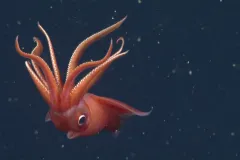Meet the Only Squid that Willfully Lops off its Arms

Lopping off one’s arm sounds like a harrowing experience, but for one deep-sea squid, it’s a matter of life or death.
When hiding from predators doesn’t do the trick, a squid has several other defense mechanisms at its disposal. It can startle an oncoming predator, physically attack it, move erratically to confuse it, play dead, flee, or, in the case of the deep-sea squid Octopoteuthis deletron, sever ties with a body part.
O. deletron is the only squid known to purposefully lose one of its eight arms as a way to escape a predator. It may seem like a dramatic antic, but the jettisoned arm likely serves as a distraction, allowing the squid to stealthily escape. When attacked or threatened the squid will grasp the predator, sever the arm at the point of contact, and often jet away after releasing a cloud of ink to mask its movement. The arm, now separate from the body and suspended in the water, will wriggle for up to half a minute, its tips conspicuously glowing in the dark from bioluminescent photophores. The intense darkness of the deep ocean is so pervasive that the slightest light, like the light emitted from a squid arm, is intriguing enough to draw the attention of a predator.
Self-amputation, or autotomy, is not unique to this squid. Lizards will drop a tail to escape an attack, and some coastal octopuses will even drop an entire arm to avoid becoming a meal. But O. deletron is unique in that it does not sever its entire arm, rather, it will only sever the length that has contact with the predator.
Stephanie Bush, now a scientist at the Smithsonian’s National Museum of Natural History, studied these unique squids for about a decade. She determined that O. deletron has evolved this tactic in what she calls “economy of autotomy”— being stingy about the length of the arm that is parted with. Severing an entire arm is costly. It means the squid has less maneuverability and propulsion, a hindrance to grabbing food or avoiding predators in the first place. Severing the smallest arm portion necessary means that the squid can maximize its ability to partake in day-to-day activities.
It also means it takes less time and energy to perform at maximum capacity once again. In addition to being able to sever their arms, O. deletron can also regrow them, which is a pretty nifty trick considering 27 percent of observed O. deletrons in the wild had at least one arm lopped off, and some had all eight. Growing the missing arms back is an important adaptation if all arms could potentially be lost.
The existence of this incredible squid is also a reminder that exploring the deep ocean is often like traveling to an alien world. On our own planet, there are creatures waiting to be discovered and amaze us with their ingenuity.


